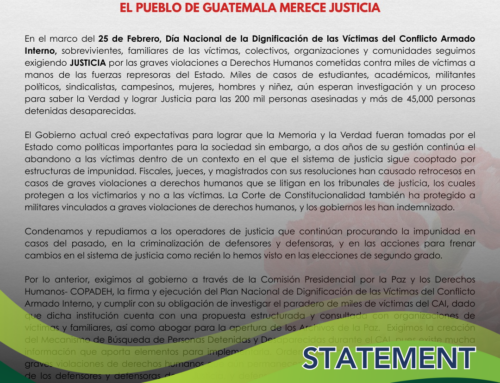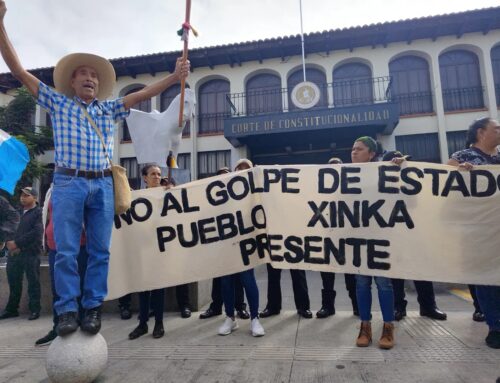Next week, a verdict is expected in the retrial of José Mauricio Rodríguez Sánchez, former head of military intelligence under General José Efraín Ríos Montt’s 1982-1983 dictatorship in Guatemala. Rodríguez Sánchez faces charges of genocide and crimes against humanity for the particular role he played in classifying the entire Ixil population as enemies of the state and gathering and using the necessary military intelligence to carry out genocide against them.
Our many years accompanying genocide survivors have taught us that verdicts are neither the end nor the beginning, and no one case tells the whole story. Long before survivors gave their testimonies in the courtroom, communities organized to articulate, plan, and carry out a multilayered fight for justice, knowing that their work would continue long past a trial’s end and that their contribution would live to inform future struggles. The coming verdict in the Rodríguez Sánchez trial has flourished from this hard work and courage.
Since survivors first filed formal complaints of genocide against former dictator Romeo Lucas García in 2000 and Ríos Montt in 2001, dozens of cases prosecuting former members of the military for forced disappearance, sexual violence, massacres, and other crimes against humanity have advanced. Forty-five high-ranking military officers or special forces have been charged with genocide and/or crimes against humanity since 2000 – 16 of whom received training at the U.S. School of the Americas. Taken as a whole, 18 years of legal cases have helped reveal the scope of state violence during the armed conflict and its many impacts, while highlighting the profound need for truth, healing, and social change.
Both the resilience and the organizing tactics of groups like the Association for Justice and Reconciliation (AJR) are helping to weave back together the social fabric that people like Rodríguez Sánchez and Ríos Montt were bent on destroying. Right now, tens of thousands of Guatemalans are taking to the streets to denounce the corruption of President Jimmy Morales and his government and call for an end to impunity – building from the decades of work by survivors marching in those same streets and gathering in front of that same presidential palace to denounce impunity and state violence. We lift up their struggle, recognizing the importance of rooting today in a long journey that has been shaped by countless people.
Read more >
The role of military intelligence in carrying out crimes against humanity and genocide
Following the 2013 Constitutional Court decision to effectively annul the genocide verdict against Ríos Montt, the case was sent to a retrial. While an undeniable affront to justice, this decision has also given plaintiffs the opportunity to build an even stronger case against Rodríguez Sánchez and focus on the essential role he played as a chain of command position and an intellectual author of crimes against humanity and genocide. During the time that the retrial was stalled, however, another important case reached a verdict for the 1981 forced detention and rape of Emma Molina Theissen and the subsequent forced disappearance of her 14-year-old brother, Marco Antonio. Among those prosecuted included former head of military intelligence under Lucas Garcia’s dictatorship, Manuel Callejas y Callejas, and Intelligence Officer Hugo Ramiro Zaldaña Rojas. The Molina Theissen trial helped reveal the important role military intelligence played in facilitating crimes against humanity and was the first time a former head of military intelligence was successfully prosecuted for those crimes. If Rodríguez Sánchez is found guilty, it will be the first time a former head of military intelligence will be found guilty of genocide.
Read more >
- Read about the Molina Theissen trial and powerful statement by Emma Molina Theissen
- Read more about the Rodríguez Sánchez trial and the closing arguments by human rights lawyer, Edgar Pérez
The power of women’s testimonies in the face of sexual violence
In the same way that cases prosecuting former members of military intelligence have grown from each other and progressed simultaneously, so too have cases prosecuting sexual violence. In the 2013 sentence convicting Ríos Montt of genocide and crimes against humanity, sexual violence was identified as a key element of the state’s counterinsurgency campaign. Point 73 identifies, “Members of the Army of Guatemala under [Ríos Montt’s] command… used sexual violence as a ‘weapon of war,’ which is considered torture under International Law…These actions, taken as a whole, were aimed at consolidating the result of the military operations within the framework of the counterinsurgency strategy.” While the genocide trial didn’t focus strictly on sexual violence, the testimony of Ixil women was a breakthrough in the struggle to make rape visible as an act of war and genocide.
This incredible effort – spanning several decades – to chip away at the wall of impunity and silence around acts of sexual violence, has helped create the conditions whereby the women-centered 2017 Sepur Zarco trial could advance with sexual violence and sexual and domestic slavery as the primary focus. Based largely on the testimonies of 15 Q’eqchi’ survivors, a Guatemalan tribunal convicted two men—former Military Commissioner Heriberto Valdez Asig and former Colonel Esteelmer Francisco Reyes Girón—of crimes against humanity for sexual and domestic slavery carried out at a military recreation center in the 1980s. While they faced charges for other crimes committed in the same context, including the forced disappearance of several of the women’s husbands, the trial holds national significance as the first transitional justice case in Guatemala to firmly center the experiences and impacts of sexual and domestic violence against women during the internal armed conflict.
Read more >
- Read more about the Sepur Zarco trial and read our report, “Beyond the Verdict: the need for comprehensive reparations”
- Read about the brave women who testified during the genocide trial to surviving sexual violence
Follow @NISGUA_Guate for live updates
While plaintiffs have built a solid case against Rodríguez Sánchez and hope for a successful verdict, survivors have also spent decades fighting for justice outside the court room. Read a previous NISGUA report, “Forced disappearance: Resilience and creativity in the defense of memory and search for justice,” as well as our latest, “18 years seeking justice in the courts” for a snapshot of justice struggles in Guatemala. Accompany us on social media next week as we report from inside the courtroom on this emblematic case.






Leave A Comment